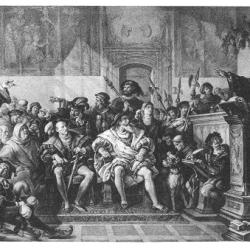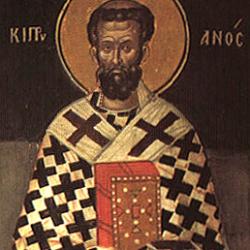Gavin Ortlund is an author, speaker, and apologist for the Christian faith, who serves as the senior pastor of First Baptist Church of Ojai in Ojai, California. Gavin has a Ph.D. from Fuller Theological Seminary in historical theology, and an M.Div from Covenant Theological Seminary. He is the author of seven books as well as numerous academic and popular articles. For a list of publications, see his CV. He runs the YouTube channel Truth Unites, which seeks to provide an “irenic” voice on theology, apologetics, and the Christian life.
I greatly admire and appreciate Gavin’s ecumenical methodology, and viewpoint. It’s extremely refreshing to hear in this hyper-polarized age. He is an exemplary Christian role model of this open-minded, charitable approach. We all learn and “win” when good, constructive dialogue takes place. It’s never a “loss” to arrive at more truth or to recognize one’s own error.
*****
This is a reply to Gavin’s video, “Trent Horn and Gavin Ortlund on Baptism” (4-27-22). Gavin’s words will be in blue. Trent Horn’s in green. Trent is, of course, an excellent Catholic apologist and quite capable of holding his own. This reply is no reflection on him at all. I just thought I’d add my $00.02′ worth, since I’ve debated this issue a few times in recent days. This was an excellent, thought-provoking debate. It stimulated me to make responses. This is why dialogue is so helpful and wonderful.
I do understand baptism to be more than just a symbol. . . . I understand baptism to give grace. I understand God to be the One working through baptism . . . I’ve used the language of “sign and seal”, . . . I just don’t understand it to be the cause of regeneration . . . It’s kind of like when we say “the blood of Jesus saves”: we don’t mean the blood as distinct from the flesh. Similarly, when we say “baptism saves” we don’t mean baptism as distinct from those events that lead up to it, but we mean baptism in its symbolic and kind of representative character. [4:46-5:55]
This is interesting. I thank Gavin for his articulate explanation (as usual). I would note two things here. I did a search of “save” and “blood” in the RSV and found nothing directly applicable, but I did find this interesting passage: “Since, therefore, we are now justified by his blood, much more shall we be saved by him from the wrath of God” (Rom 5:9). This seems to back up Gavin’s analogy. “Justified by his blood” would not be strictly literal, but is a synonym for saying “saved by him.” Other similar verses:
Romans 3:25 (RSV) whom God put forward as an expiation by his blood, . . .
Ephesians 1:7 In him we have redemption through his blood, the forgiveness of our trespasses, according to the riches of his grace
Revelation 1:5 . . . To him who loves us and has freed us from our sins by his blood
My second observation would be to ask Gavin: can you produce any direct biblical indication (beyond analogy to Christ’s blood) for why you take this particular view?
I wouldn’t say that baptism justifies. I would say that we can speak of God communicating grace through baptism, which would include forgiveness. [6:38-49]
How is this different, though, from simply saying that “forgiveness of sins comes through baptism” or “baptism is God’s means to forgive our sins”? It seems to be a distinction without a difference. But if this forgiveness is ongoing, as Gavin also said, then baptism offering that would not be a unique thing.
It would be in that “bucket” [of sanctification] [7:11-13].
For Protestants, sanctification is a literal thing, but is formally disconnected from justification and salvation in a way different from Catholic theology. But it’s good to find the common ground of baptism doing something real and actual in the Christian’s life.
Gavin states that the receiving of grace through baptism is not “automatic” and would “depend upon receiving the sacrament worthily, which I would understand as by faith.” [7:22-36]
This would rule out baptism of infants by definition (a point that Trent also immediately made in response). Trent said that he didn’t know of anyone who believes in baptismal regeneration, who don’t also believe in infant baptism. Actually Churches of Christ believe in solely believer’s baptism, which regenerates. They deny the need for infant baptism, but they do so also because they deny the existence of original sin (no sin to be saved from, in other words). Disciples of Christ came from the same Campbellite origins, but they appear to accept infant baptism.
Gavin then makes the same point about Churches of Christ. I am answering while I listen, so I anticipated his answer (I didn’t merely repeat or reiterate it). Trent quickly agreed. That leaves four groups. I would add a fifth: the Salvation Army doesn’t baptize at all: or at least it doesn’t require it or consider it a necessity.
Gavin asked if Cornelius was saved by baptism (see Acts 10). Trent replied that it was an exception or “boundary case.” I agree. This was a unique transitional period, with Gentiles coming into the Church, and the advent of the indwelling Holy Spirit, as seen in Acts 2 on the Day of Pentecost. During the transition, there are a few people mentioned in Scripture who can’t be neatly fit into normative categories. But Gavin takes the opposite view and states that the case of Cornelius is “consistent with how baptism is functioning in Acts, where it just doesn’t look like you ever have the Spirit poured out or any fruits of regeneration at the time of baptism” [13:24-36].
I think Acts 2:38 strongly implies receiving the Holy Spirit upon baptism (“be baptized . . . and you shall receive the gift of the Holy Spirit”.). So does Paul’s baptism by Ananias (” ‘that you may regain your sight and be filled with the Holy Spirit.’ . . . Then he rose and was baptized”: Acts 9:17-18). Romans 6:3-4 states that we are “baptized . . . in order that, . . . we too may live a new life.” A “new life” is certainly a fruit of regeneration. Colossians 2:11-13 says that baptism appears to be the cause of us being “made alive.” Galatians 3:27 says that the result of being baptized is being “clothed with Christ.” What more can anyone ask for?! Titus 3:5 seems to directly connect salvation to “the washing of regeneration” accompanied by “renewal in the Holy Spirit.” Sins are washed away (“be baptized, and wash away your sins”: Acts 22:16).
I don’t think this is correct, is that baptism is when one comes spiritually alive to God. [17:55-18:03]
Again, I would say, how is it not being made spiritually alive, to “receive the gift of the Holy Spirit” and “be filled with the Holy Spirit”, to be given a “new life” and “made alive” and “clothed with Christ”? All of this appears to me to be directly tied to baptism as the cause, in the above passages. Moreover, four passages tie baptism in with being “saved”: using that very word (Acts 2:40; 1 Pet 3:21; Mk 16:16; Titus 3:5). If all of that is not “com[ing] spiritually alive to God” what words would be a clear indication that that took place? I submit that it seems to me to be as explicit and clear as it can possibly be. In Colossians, Paul even uses the phrase “made alive” that Gavin himself uses, as the very definition of regeneration [25:42-47].
To put it another way, what would be a hypothetical example of a Bible verse that was so compelling that Gavin would be convinced of baptismal regeneration in the Catholic sense?
Gavin mentions many people that he has observed as a pastor, undergoing a spiritual conversion and manifesting faith and its fruits before they ever get baptized. Trent agreed that faith precedes baptism in adults and that the Holy Spirit is already at work. He brought up the Catholic distinction between actual and sanctifying grace. The former is God urging or moving a person to go on to receiving sanctifying grace. Trent called the positive movement prior to baptism a “work of grace” and a “spiritual kick in the pants” but not regeneration, and said that these matters are “complicated” and also include the aspect of psychology and “natural virtues.”
Gavin affirms — just for the record — that he is a “Calvinist.” He believes in all five points of TULIP (as he said shortly after). So he is a Reformed Baptist [28:26-27].
Trent mentions “baptism of desire” and “baptism of blood” (martyrdom) as exceptions to the rule of baptism being the cause of regeneration.
Gavin brings up the question of the eternal fate of unbaptized infants and mentions limbo. Limbo was never an official dogma of the Catholic Church, as I have written about.
Gavin states that the Church fathers meant different things by “baptismal regeneration.” Trent noted (as I would have) that patristic historians like J. N. D. Kelly describe baptismal regeneration among the fathers with words like “universal.” But Gavin reaffirmed that the term “baptismal regeneration” was used differently by different fathers. That may very well be, but the more knowledgeable such a scholar was, he would, I think, incorporate that fact into his analyses.
Trent asked Gavin which historical figure would have been the first to affirm his own view on baptism. Gavin said it was Justin Martyr.
Gavin brings up what I would say is another excellent biblical reference to biblical regeneration, and asks Trent’s thoughts on it:
Hebrews 10:22 let us draw near with a true heart in full assurance of faith, with our hearts sprinkled clean from an evil conscience and our bodies washed with pure water.
Trent said this referred to an event in the past (baptism) that is still having an effect in the future. He describes what the passage refers to as “perseverance rooted in baptismal graces.” He says that the phrase “hearts sprinkled clean” is also a reference to baptism. Fascinating! I never considered this verse before in relation to baptism. There probably are other passages that I have missed that don’t have the word “baptism” in them.
This was one of the finest, most excellent, Protestant-Catholic exchanges I have ever seen in my 42 years of committed Christian discipleship. This is how it ought to be done. I thoroughly enjoyed it and learned a lot of things. Super kudos to both Gavin and Trent!
***
Practical Matters: Perhaps some of my 4,000+ free online articles (the most comprehensive “one-stop” Catholic apologetics site) or fifty books have helped you (by God’s grace) to decide to become Catholic or to return to the Church, or better understand some doctrines and why we believe them.
Or you may believe my work is worthy to support for the purpose of apologetics and evangelism in general. If so, please seriously consider a much-needed financial contribution. I’m always in need of more funds: especially monthly support. “The laborer is worthy of his wages” (1 Tim 5:18, NKJV). 1 December 2021 was my 20th anniversary as a full-time Catholic apologist, and February 2022 marked the 25th anniversary of my blog.
PayPal donations are the easiest: just send to my email address: apologistdave@gmail.com. You’ll see the term “Catholic Used Book Service”, which is my old side-business. To learn about the different methods of contributing, including 100% tax deduction, etc., see my page: About Catholic Apologist Dave Armstrong / Donation Information. Thanks a million from the bottom of my heart!
***
Photo credit: PublicDomainPictures (7-18-13) [Pixabay / Pixabay License]
***
Summary: Baptist pastor & author Gavin Ortlund had a wonderful, stimulating YouTube chat with Catholic apologist Trent Horn. I interject my own thoughts here and there.


















